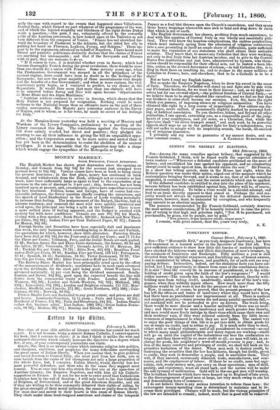Itttng fa tOt Etitor.
A REMONSTRANCE.
February 1, 1860.
Sui—One of your able articles of literary criticism has caused me much regret. It is not because, being a sincere Roman Catholic, I cannot approve his book, that I venture to object : it is that I think it unlike the wise and unbiassed discretion which usually honours the Spectator in a degree which few, if any, of your contemporary journalists can claim. Surely, Sir, that is an unwise course which intrudes religion into politics, and sharpens, embitters, and perplexes the many difficulties surrounding the great cause of Italian liberty. When you assume that, to give political and social freedom to Central Italy, she must part from her faith, you at once banish from the ranks of her champions not only a large proportion of the whole force, but, I conceive, Italian liberty', would, thereby lose her most powerful defenders, and those who do the cause they support most honour. You at once lose him who struck the first axe at the upas-tree of Austrian tyranny, the Emperor Napoleon, and with him all his Catholic supporters in France. It is not for me now to enter proof that Catholicism flourishes best in the soil of freedom ; I will only turn to the free Catholics of Belgium, of Switzerland, and of the great American Republic, and ask if they are willing to be thus summarily debarred their rights of aiding, by the great strength of their moral influence, the cause so justly dear to them ? For most dear and sacred to their hearts is this cause of Roman liberty. They chafe under those loud-tongued assertions and claims of the temporal
Papacy as a foul blot thrown upon the Church's escutcheon, and they spurn those heavy trappings wherewith men seek to bind and drag down to earth that which is not of earth.
The Engliah Government has chosen, profiting from much experience, to deal with this question of Central Italy as one wholly and essentially poli- tical. They well know the hopeless complications, the endless perplexities, which must instantly spring from the admission of religious controversy into a case presentin,g in itself an ample share of difficulties, quite sufficient to make the reputation of any statesman who shall obtain their amicable solution. They know that, to assure any Catholics that they were working, not only to free Italy from her Austrian incubus, and to give to the Central States free institutions and just laws, administered by laymen, who them- selves should be responsible for their official acts, not to bestow a boon like this, unless as the avowed forerunner of schism,—to tell Catholics this, is to fling in their faces an insulting lie, and to declare to the many millions of Catholics in France, here, and elsewhere, that to be a Catholic is to be a slave !
Not so have I read my English history.
Not so spoke the Emperor Napoleon, when he drew his sword in the cause of Italy. Therefore, we Catholics will stand up and fight side by side with our Protestant brethren, for we trust in their honour ; and, as we fight our- selves but for one avowed object,—the political freedom of Central Italy,—so we believe them to be single-minded like ourselves, and we feel no fear that our brothers in arms shall become our enemies. Few, Sir, have the right which you possess, of imposing silence on religious animosities.' You have obtained this right by a long course of impartiality. Few editors can dis- play pages, never sullied, if occasionally slightly marked by personal feel- ing, or habitual association. To you therefore, before, and beyond all other journalists, I can appeal, entreating you, as a responsible guide of the judg- ments of your countrymen, and yet more, as a Christian, that, while the Spectator shall " iti silver trumpet sound," and each week by its powerful appeals shall urge us on in the gallant fight for Italy's independence, you will not suffer to mingle with its inspiriting sounds, the harsh, ill-omened cry of religious dissension.
I privately add my name in guarantee of my earnest desire, and am






























 Previous page
Previous page